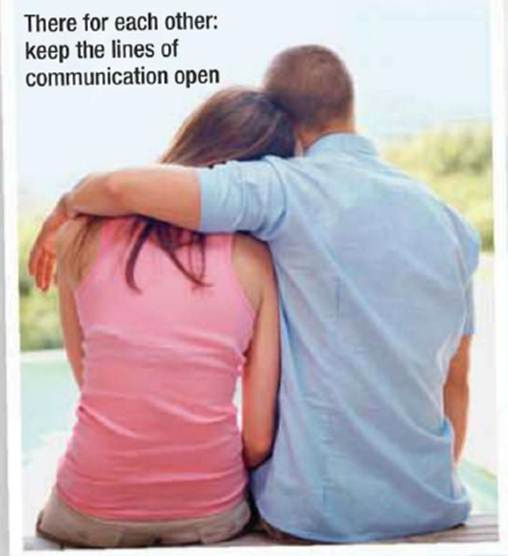Talk it through

There
for each other: keep the lines of communication open
Many people still see a cacer diagnosis as
a death sentence, and couples stop communicating with each other because that
fear of loss is too hard to put into words. While the patient’s energy is
focussed on trying to survive, their partner may thinl it is selfish to voice
their own worries. Its is also vital to talk about your feelings, aither in a
session with a Relate counsellor (call Macmillan on 0808 808 0000 to find one)
or somewhere that was positive and speccial to you both before the diagnosis.
The discussion should be limited to one hour, and if you do not know how to
start, try an invitation: ‘ It would help me if I could tell you how I feel,
and I would like to know how your are feeling, too.’
Keep calm and carry on

‘How
am I going to care for my wife and my family?’
Post- diagnosis, most women will not be
able to carry on with all the things they normally do, but kids still need
feeding and taking to school, and family life has to carry on. Both partners’
roles will have to change, and while the woman may lose her sense of identity,
her partner may feel unable to cope with the extra responsibilities. It is
important not to get overwhelmed. Rather than thinking ‘How am I going to care
for my wife and my family?’ encourage him to break it down into more manageable
tasks such as” ‘Which of our friends can take the kids to school, while I drive
her to hospital?’
Intimacy does not have to mean sex

More
than 40% on cancer patients say their sex life suffers
Surgery or chemotherapy can affect both
your congidence- and desire. More than 40% on cancer patients say their sex
life suffers, according to research by Macmillan. It is important to explain
how you feel and remember that intimacy can come from touching, massaging and
kissing, too. Make time for each other, prganise a date night and laugh
together- finding humour in a difficult situation is a great way to relieve
stress and feel closer.
Remember he is suffering, too
When a woman receives a diagnosis, her
partner may be so worried about her that he stops looking after him self. It is
not unusual for partners to become depressed, but because feeling sad does not
necessarily mean bursting into tears, it can be hard to spot. You will need to
keep an eve on how your partner is coping and, if necessary, arrange to see
your GP together. Its is vital that he has somerone he trusts to talk to when
you can not be there, so encourage him to open up to members of your extended
family and close male friends .